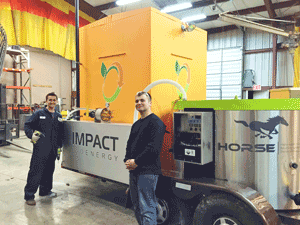Seattle-based company will partner with public benefit corporation to develop a closed-loop for organics.
Seattle-based Impact Bioenergy has announced it has recently completed an agreement with ForTheGood Public Benefit Corp. (FTG) as the first U.S. and Washington state customer of the Horse microdigester. The Horse is described by Impact Bioenergy as a living machine that uses biomimicry to convert food waste into renewable energy and fertilizer with zero waste.
FTG is working on building a community-scaled “hyperlocal” enterprise with craft food and beverage businesses and urban farmers to divert their rich bioresources from hauling and disposal.
 |
| The fabrication team in Washington state for Impact BioEnergy. |
FTG is focused on taking fossil fuel out of the waste recycling and fertilizer equations. That in turn creates the opportunity to take the truck out of the food supply equation as well.
The three biggest benefits to on-site organics recycling, say the companies, are:
- diversion from disposal and export;
- production of valuable biofertilizer; and
- production of renewable bioenergy.
Together, with Seattle Urban Farm Company, FTG plans to add urban greenhouse food production to fully capture the heat, humidity, carbon dioxide and fertilizer benefits by coupling a greenhouse to the bioenergy system.
On Jan. 1, 2015, the city of Seattle Ordinance #124582 no longer allowed food and compostable paper, including food-soiled pizza boxes, paper napkins and paper towels, in the garbage. The Horse microdigester offers a local and enterprising solution for compliance with this ordinance in an innovative way, says Impact Bioenergy. No collection or export of organic waste from the city is necessary. FTG has entered a collaboration with Impact Bioenergy called Community Supported Bio to bring these benefits to individual neighborhoods and businesses. FTG and Impact will jointly develop and deploy, in phases, a 1 mile radius closed-loop for organics with no collection truck, enabling a net-negative carbon ecosystem.